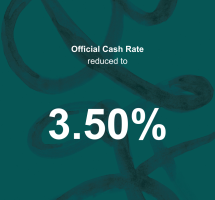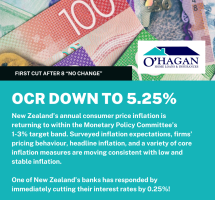Important News About Your Home Loan
27 March 2020
The Government has announced that the banks will be offering a 6-month mortgage holiday to help homeowners deal with the financial implications of the COVID-19 crisis. For most households, mortgage repayments are one of the biggest regular expenses, so being able to avoid that payment is appealing and in some cases almost essential.
There are a few things you need to know…
Firstly, we would point out that while mortgage holidays can seem like a gift, the banks are not actually giving away anything. In fact, the way mortgage holidays work will see the banks earn more money from you.
Ordinarily, when you pay your mortgage you pay both principal and interest so over time the money that you owe the bank reduces. For example, if you have a $300,000 mortgage at 3.99% p.a. your weekly repayment would be $344 over a 30-year loan term. This payment would be $230 of interest and $114 of principal. If you did not make that week’s payment because the bank gave you a “mortgage holiday” then your loan balance would increase by $230 and so when you make a payment the next week your loan balance has increased to $300,230 and therefore your repayment has increased to $345. It seems like a small increase, but over time this grows exponentially. In this example, if you opt for a 6-month mortgage holiday your loan would increase by $2,880.29 or an average of just over $110 weekly.
What is the best action to take?
There is no doubt that we’re living in times that are nothing like “normal” and we are all having to adapt. One of the largest concerns for many is the financial impact of not being able to work, and the implications of not being able to pay the mortgage, other loans, regular bills and of course the basic necessities such as the groceries. So what steps can you take to minimise any financial pain during this time of uncertainty?
Options for managing your home loan
Mortgage holidays – a mortgage holiday means that you do not need to make regular mortgage repayments for a period of time. The bank will add the interest to your loan balance which means you will still end up paying your mortgage but it gives you a short time to take a breath. The time-frame is normally for 3 months, but after discussions with Grant Robertson, this has been extended to 6 months.
Interest-only – this is often a good option as it reduces the amount of each repayment but you are not increasing your debt.
Extending loan term – another way to reduce your repayments is to spread the payments over a longer-term or timeframe. So, if you only have 20 years remaining on your mortgage, the bank may be happy to extend the term by 5 or 10 years and this will reduce your repayments.
Loan top-ups – sometimes the best option is to top up your loan. This can give you the money to pay your next few loan repayments but more importantly, it can be used to reduce other financial commitments like credit card debt, hire purchases or personal loans, which often have higher interest and higher repayments.
Caveat loans or second mortgages – if your existing bank is not able to help with a loan top-up you may be able to take out a loan with another lender. If that loan is secured with a caveat or a second mortgage it will reduce the cost, although it will always be a lot more expensive than a top-up with your existing bank.
Refinancing your mortgage – if you are not happy with your existing bank or lender then refinancing your mortgage may be the preferred option.
Kiwisaver holiday - You can stop your Kiwisaver contributions for up to a year. For someone on $100,000 that is $250 per month and can make a bit of a difference. The following link provides information on suspending your KiwiSaver contributions: https://www.kiwisaver.govt.nz/already/change-contrib/savings-suspension/
Working for Families - During this time, many New Zealanders may become eligible for Working for Families as salaries get reduced from above the threshold. Working for Families Tax Credits are payments for families with dependent children aged 18 or under. While everyone's situation is different, if you have a child (or children) under the age of 18 at home, then it could be worth a quick look. The IRD has plenty of information on how this works, here are some more useful links:
Working for Families: https://www.ird.govt.nz/topics/working-for-families/how-working-for-families-works
Eligibility: https://www.ird.govt.nz/topics/working-for-families/can-i-get-working-for-families
Calculators: https://myir.ird.govt.nz/eservices/home/_/
Getting started: https://www.ird.govt.nz/tasks/register-for-working-for-families
Applying for financial hardship – this is typically a last resort but is something that all banks and lenders need to consider and work with you on. Prior to applying under the hardship criteria, you should consider all other options including applying for the release of Kiwisaver monies via financial hardship too. Everyone is going to have a different situation and therefore should consider all options.
If you wish to apply for one of these Financial packages from the banks then first point of call is to contact them via their website or their 0800 number customer care numbers.
WE ARE HERE TO HELP
We know times are not easy and you may not even want to consider any of the options listed above. However, it is important that you at least know what the options and are prepared to act early rather than wait until you are really struggling.
If you’re trapped at home and are keen to get some advice about your finances then contact your Advisor by email.
John White - john@ohagans.net.nz
Stephen Clayton - stephen@ohagans.net.nz
Trish Marsden - trish@ohagans.net.nz



